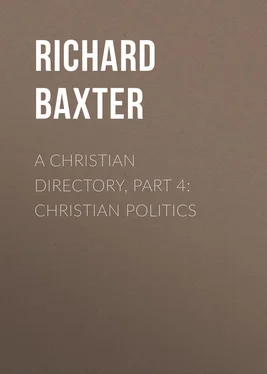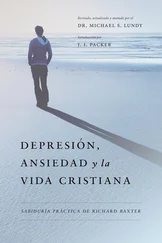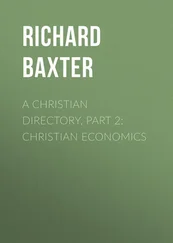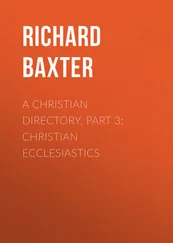Richard Baxter - A Christian Directory, Part 4 - Christian Politics
Здесь есть возможность читать онлайн «Richard Baxter - A Christian Directory, Part 4 - Christian Politics» — ознакомительный отрывок электронной книги совершенно бесплатно, а после прочтения отрывка купить полную версию. В некоторых случаях можно слушать аудио, скачать через торрент в формате fb2 и присутствует краткое содержание. Жанр: foreign_antique, foreign_prose, на английском языке. Описание произведения, (предисловие) а так же отзывы посетителей доступны на портале библиотеки ЛибКат.
- Название:A Christian Directory, Part 4: Christian Politics
- Автор:
- Жанр:
- Год:неизвестен
- ISBN:нет данных
- Рейтинг книги:3 / 5. Голосов: 1
-
Избранное:Добавить в избранное
- Отзывы:
-
Ваша оценка:
- 60
- 1
- 2
- 3
- 4
- 5
A Christian Directory, Part 4: Christian Politics: краткое содержание, описание и аннотация
Предлагаем к чтению аннотацию, описание, краткое содержание или предисловие (зависит от того, что написал сам автор книги «A Christian Directory, Part 4: Christian Politics»). Если вы не нашли необходимую информацию о книге — напишите в комментариях, мы постараемся отыскать её.
A Christian Directory, Part 4: Christian Politics — читать онлайн ознакомительный отрывок
Ниже представлен текст книги, разбитый по страницам. Система сохранения места последней прочитанной страницы, позволяет с удобством читать онлайн бесплатно книгу «A Christian Directory, Part 4: Christian Politics», без необходимости каждый раз заново искать на чём Вы остановились. Поставьте закладку, и сможете в любой момент перейти на страницу, на которой закончили чтение.
Интервал:
Закладка:
4. It being not possible that the ruler in his laws can foresee and name all exceptions, which may occur, it is to be supposed that it is his will that the nature of the thing shall be the notifier of his will, when it cometh to pass; and that if he were present, and this case fell out before him, which the sense and end of the law extendeth not to, he would say, This is an excepted case.
5. There is therefore a wide difference between a general law, and a personal, particular mandate; as of a parent to a child, or a master to a servant; for this latter fully notifieth the will of the ruler in that very case, and to that very person. And therefore it cannot be said that here is any exception, or that it is not his will; but in a universal or general law, it is to be supposed that some particular excepted cases will fall out extraordinarily, though they cannot be named; and that in those cases, the ruler's will dispenseth with it.
6. Sometimes also the ruler doth by the mere neglect of pressing or executing his own laws, permit them to grow obsolete, and out of use; and sometimes he forbeareth the execution of them for some time, or to some sort of persons; and by so doing, doth notify that it was not his will that at such a time, and in such cases, they should oblige. I say not that all remissness of execution is such a sign; but sometimes it is: and the very word of the lawgiver may notify his dispensation or suspending will. As for instance, upon the burning of London, there were many laws (about coming to parish churches, and relief of the poor of the parish, and the like) that the people became uncapable of obeying; and it was to be supposed, that the ruler's will would have been to have excepted such cases if foreseen; and that they did dispense with them when they fell out.
7. Sometimes also the penalty of violating a law, is some such mulct or service, which the ruler intendeth as a commutation for the duty, so that he freely leaveth it to the choice of the subject which he will choose. And then it is no sin to pay the mulct, and omit the action; because it crosseth not the lawgiver's will.
8. Sometimes also the law may command this principally for some men's sake, which so little concerns others, that it should not extend to them at all, were it not lest the liberty of them should be an impediment to the obedience of others, and consequently of the common good. In which case, if those persons so little concerned, do but omit the action secretly, so as to be no scandal or public hurt, it seemeth that they have the implicit consent of the rulers.
9. Sometimes particular duties are commanded with this express exception, "Unless they have just and reasonable impediment." As for coming every Lord's day to church, &c.; which seemeth to imply, that (though in cases where the public good is concerned, the person himself shall not be judge, nor at all as to the penalty, yet that) in actions of an indifferent nature in themselves, this exception is still supposed to be implied, "unless we have just and reasonable impediments," of which in private cases, as to the crime, we may judge.
10. I need not mention the common, natural exceptions: as that laws bind not to a thing when it becometh naturally impossible; or cessante materia, rel capacitate subjecti obligati , &c.
11. Laws may change their sense in part by the change of the lawgiver; for the law is not formally to us his law that is dead and was once our ruler, but his that is alive and is now our ruler. If Henry the Eighth make a law about the outward acts of religion, (as for coming to church, &c.) and this remain unrepealed in King Edward's, Queen Mary's, Queen Elizabeth's, King James's days, &c., even till now; as we are not to think that the lawgivers had the same sense and will, so neither that the law hath the same sense and obligation; for if the general words be capable of several senses, we must not take it as binding to us in the sense it was made in, but in the sense of our present lawgivers or rulers, because it is their law.
12. Therefore if a law had a special reason for it at the first making, (as the law for using bows and arrows,) that reason ceasing, we are to suppose the will of the lawgiver to remit the obligation, if he urge not the execution, and renew not the law.
13. By these plain principles many particular difficulties may be easily resolved, which cannot be foreseen and named, e. g. the law against relieving a beggar bindeth not, when he is like to die if he be not relieved; or in such a case as after the burning of London, when there was no parish to bring him to. A law that is but for the ordering of men's charity, (to soul or body, by preaching or alms,) will not disoblige me from the duties of charity themselves, in cases where Scripture or nature proveth them to be imposed by God. A law for fasting will not bind me, when it would be destructive to my body; even on God's sabbaths duties of mercy were to be preferred to rest and sacrifices.
14. If God's own laws must be thus expounded, that When two duties come together, and both cannot be done, the lesser ceaseth at that time to be a duty, and the greater is to be preferred, man's laws must also be necessarily so expounded: and the rather, because man's laws may be contradictory, when God's never are so, rightly understood.
15. Where the subject is to obey, so far he must discern which of the laws inconsistent is to be preferred; but in the magistratical execution, the magistrate or judge must determine.
E. g. One law commandeth that all the needy poor be kept on the parish where they were born or last lived. Another law saith, that nonconformable ministers of the gospel, who take not the Oxford oath, shall not come within five miles of city or corporation, (though they were born there,) or any place where they have been preachers. In case of necessity what shall they do? Answ. Whither they shall go for relief, they must discern as well as they can; but whither they shall be carried or sent, the magistrate or constable must discern and judge.
Also whether he shall go with a constable that by one law bringeth him to a place, which by the other law he is forbid on pain of six months' imprisonment in the common gaol to come to? Answ. If he be not voluntary in it, it is not his fault: and if one bring him thither by force, and another imprison him for being there, he must patiently suffer it.
16. But out of such excepted cases, the laws of our rulers (as the commands of parents) do bind us as is afore explained; and it is a sin against God to violate them.
17. Yea, when the reason of the law reacheth not our particular case and person, yet when we have reason to judge, that it is the ruler's will that all be bound for the sake of some, and the common order and good will be hindered by our exemption, we must obey to our corporal detriment, to avoid the public detriment, and to promote the public good.
CHAPTER IV.
DIRECTIONS TO LAWYERS ABOUT THEIR DUTY TO GOD
Gentlemen, you need not meet these directions with the usual censures or suspicions, that divines are busying themselves with the matters of your calling, which belong not to them, and which they do not understand; you shall see that I will as much forbear such matters as you can well desire. If your calling be not to be sanctified by serving God in it, and regulating it by his law, it is then neither honourable nor desirable. But if it be, permit me very briefly so far to direct you. 114
Direct. I. Take the whole frame of polity together, and study each part in its proper place, and know it in its due relation to the rest; that is, understand first the doctrine of polity and laws in genere , and next the universal polity and laws of God in specie ; and then study human polity and laws, as they stand in their due subordination to the polity and laws of God, as the by-laws of corporations do to the general laws of the land.
Читать дальшеИнтервал:
Закладка:
Похожие книги на «A Christian Directory, Part 4: Christian Politics»
Представляем Вашему вниманию похожие книги на «A Christian Directory, Part 4: Christian Politics» списком для выбора. Мы отобрали схожую по названию и смыслу литературу в надежде предоставить читателям больше вариантов отыскать новые, интересные, ещё непрочитанные произведения.
Обсуждение, отзывы о книге «A Christian Directory, Part 4: Christian Politics» и просто собственные мнения читателей. Оставьте ваши комментарии, напишите, что Вы думаете о произведении, его смысле или главных героях. Укажите что конкретно понравилось, а что нет, и почему Вы так считаете.












